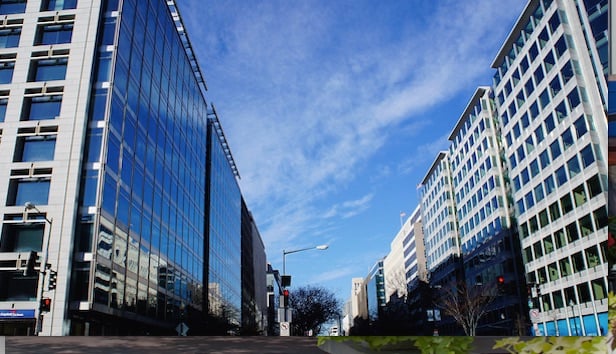WASHINGTON, DC–The Washington DC area market has closed $5.9 billion in multifamily investment sales so far this year and has another $4 billion under contract. That compares with the $6.5 billion in multifamily sales that closed for all of 2016. Meanwhile other markets are down flat or 10%. “We are above all markets — and foreign investment is a big part of that,” Bill Roohan, vice chairman with CBRE tells GlobeSt.com.
Roohan's wheelhouse is the multi-housing space, but this is a trend manifesting in many asset classes. Now, CBRE reports that Washington DC's commercial real estate sector is the third top city in the world to receive Middle Eastern investment.
The area received $469 million in investment from Middle Eastern countries in the year to Q2 2017, following New York at $820 million and London at $1.68 billion. The US is the top country destination for Middle Eastern investment volume, according to CBRE, reaching $3.9 billion for that time period.
If these investors don't seem to be as prominent as these numbers suggest that is often because they prefer to do business through a local sponsor or a Goldman Sachs, Roohan says.
“They are significant players, however, and if I had petro dollars I would get out of there too,” Roohan adds, referring to the recent decline in the price of oil, which has prompted these investors to diversify their income streams.
Middle Eastern investors also tend to be more active in non-traditional assets — that is, anything that is not office, retail and logistics. Instead they have a strong appetite for such sectors as hotels, residential, student housing and healthcare, as well as infrastructure, according to Chris Ludeman, CBRE's Global President, Capital Markets.
One factor that Middle Eastern investors have in common with most other foreign investors, though, is DC's appeal, or rather the reasons behind it: People understand it. It doesn't have to be sold. Foreign nationals are more familiar with it than a secondary market. The federal government is based here and sequestration is over.
Clearly, though, their investment interest is worldwide. According to CBRE, the Middle East represented 8% of total cross-regional investments between Q2 2016 and Q2 2017. Sovereign Wealth Funds remain the largest source of Middle Eastern capital, acquiring $5.4 billion in real estate assets globally between Q2 2016 and Q2 2017, although this represents a decline of 17% year-over-year. High net worth individuals and private investors from the region were less active compared to previous years, which indicates that this group might be more susceptible to adverse market conditions, CBRE said.
Want to continue reading?
Become a Free ALM Digital Reader.
Once you are an ALM Digital Member, you’ll receive:
- Breaking commercial real estate news and analysis, on-site and via our newsletters and custom alerts
- Educational webcasts, white papers, and ebooks from industry thought leaders
- Critical coverage of the property casualty insurance and financial advisory markets on our other ALM sites, PropertyCasualty360 and ThinkAdvisor
Already have an account? Sign In Now
*May exclude premium content© 2025 ALM Global, LLC, All Rights Reserved. Request academic re-use from www.copyright.com. All other uses, submit a request to [email protected]. For more information visit Asset & Logo Licensing.









